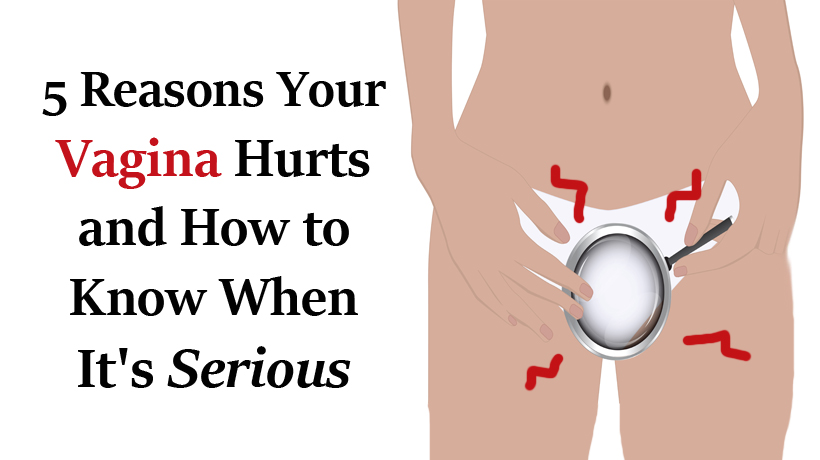Experiencing pain anywhere in the body can be distressing. But when you’re feeling pain down there, it can become the only thing you’re able to think about.
Vaginal pain is no stranger to most women. After all, around 80 percent of women experience period pain at some point in their lifetime, according to a study approved by the British Menopause Society. Period pain can be the result of unpleasant conditions such as endometriosis or pelvic inflammatory disease, or it could simply be due to cramps. But what happens when the pain you’re feeling is unrelated to your menstrual cycle? Here are five reasons you’re experiencing pain in and around your vagina, and how to know if it’s serious.
Infections
Pain in your vagina could be a sign of an infection, whether it’s sexually transmitted or otherwise. Yeast infections and bacterial vaginosis are the most common types of non-sexually transmitted infections a woman can have in her lifetime and can easily be treated. While both may result in white or grayish discharge, bacterial vaginosis can cause fishy smelling discharge, and yeast infection discharge takes on the appearance of cottage cheese.
Sexually transmitted infections (STIs) that may cause vaginal pain among other symptoms include chlamydia, gonorrhea, herpes, genital warts (which are caused by the virus HPV), or the lesser known but extremely common trichomoniasis. If you believe your vaginal pain is being caused by an STI, you should speak to your doctor about getting tested immediately.
Vaginal dryness
The walls of your vagina are usually coated in a thin layer of clear fluid. Your estrogen hormones help maintain the fluid and keep the lining of your vagina in check. But when estrogen levels drop, the amount of moisture in your vagina is reduced. This can happen for any number of reasons, including menopause, childbirth, medication, or chemotherapy. But the result is always the same: an itching, burning vagina and painful intercourse. Vaginal dryness can be treated with topical estrogen therapy to replace the estrogen your body no longer produces.
Vulvodynia
Vulvodynia is chronic vulvar pain that lacks an identifiable cause and affects more than 200,000 women each year according to the Mayo Clinic. The location, consistency, and severity of the pain may vary among women. Some report pain on only one side of the vulva, while others experience pain in multiple areas. Vulvodynia is characterized by burning sensations, itching, and rawness in the genital area. Treatments for the condition focus on relieving symptoms instead of fixing the problem and include medication, local anesthetics, pelvic floor therapy, and—in extreme cases—surgery to remove the affected tissue. If your doctor has ruled out other causes of vaginal pain, you may have vulvodynia.
Bartholin’s cyst
The Bartholin’s glands are located on each side of the vaginal opening. These glands secrete fluid that helps lubricate your vagina. When the openings of the glands become obstructed, fluid backs up into the gland, causing swelling that is usually painless called a Bartholin’s cyst. If the fluid inside of the cyst becomes infected, you could develop a collection of pus surrounded by inflamed tissue. If the Bartholin’s cyst is large enough, walking and sitting may become painful. Bartholin’s cysts can usually be treated at home by sitting in a warm bath or with antibiotics if an infection occurs. Serious cases may require surgical drainage of the cyst.
Your partner’s penis
While we can usually look at our own bodies for the source of the problem, sometimes, it could be someone else’s that’s causing a problem. If the vaginal pain you experience is mostly during sex, and your man is particularly well-endowed, your problem could be that he’s just too big. It’s even possible that his manhood is hitting your cervix during sex! If you suspect that size is the problem, try positions that minimize deep penetration, and make sure to stop by the store for some lube.
It’s important to take care of your vagina. If you’re experiencing pain or any of the other symptoms listed above, you should visit a doctor to find a solution that’s right for you.
Sources:
https://health.clevelandclinic.org/pain-down-there-5-reasons-your-vagina-hurts/
https://www.womenshealthmag.com/health/a19909207/vagina-pain/
https://www.mayoclinic.org/diseases-conditions/vulvodynia/symptoms-causes/syc-20353423
https://www.webmd.com/women/guide/vaginal-dryness-causes-moisturizing-treatments#1



